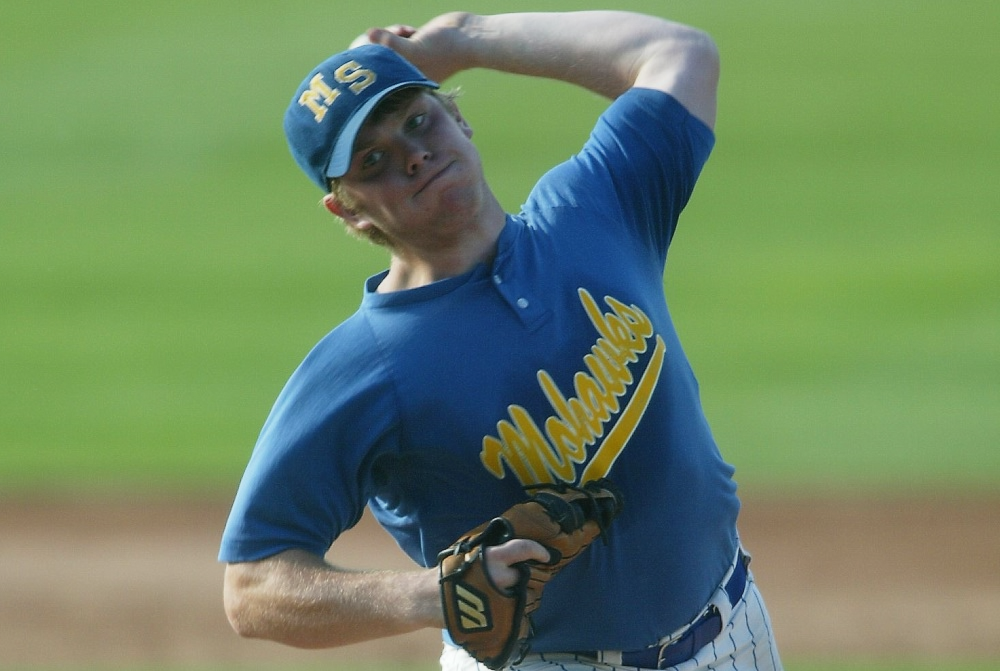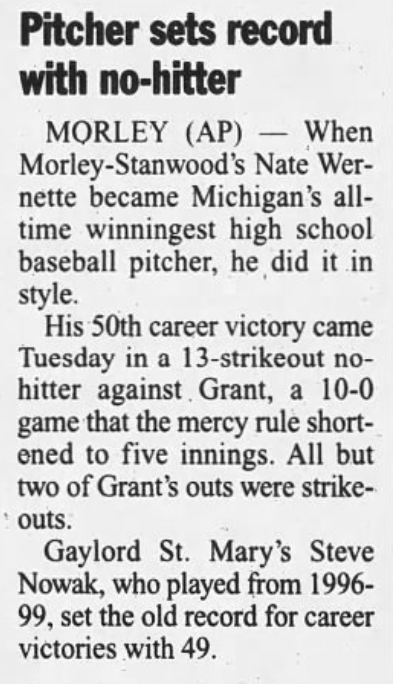
Brighton Names Baseball Field for Program Builder, Longtime Leader
By
Tim Robinson
Special for MHSAA.com
May 4, 2023
BRIGHTON — Mark Carrow didn’t know what to expect April 22 when he arrived at Brighton High School’s baseball field, where he was the guest of honor for a ceremony officially naming it Carrow Field.
 “I remember back in October, when they announced this would happen, I told my wife, Mary, that there will be probably 60-70 people here, because there are 18 players on each team and their parents,” he recalled. “We pulled up here and there were all these people, and these young men who look older now.”
“I remember back in October, when they announced this would happen, I told my wife, Mary, that there will be probably 60-70 people here, because there are 18 players on each team and their parents,” he recalled. “We pulled up here and there were all these people, and these young men who look older now.”
Dozens of Brighton alumni, some of whom Carrow hadn’t seen since their high school days nearly a half-century ago, were in attendance for the ceremony held before a doubleheader with Ypsilanti Lincoln.
Carrow retired in 2006 after 34 seasons as Brighton’s baseball coach, recording 823 wins, now eighth on the state’s all-time list. He also was an assistant football coach and coached both boys and girls middle school basketball.
He came to Brighton a year after graduating from the University of Michigan, where he played baseball for the Wolverines, starring at third base.
“My dream was to coach baseball at Ann Arbor High,” Carrow said of his high school alma mater, now Ann Arbor Pioneer. “That was my dream.”
But he had applied to Brighton Area Schools as well, and after a year teaching in Grand Rapids, he and Mary both were offered teaching positions.
“Wouldn’t you know it? We were in school for two days and Ann Arbor calls me up,” Carrow said. “They had a phys ed job open. I’d have been the JV football coach, and I knew the baseball coach was on his way out. It was everything I wanted, and I went to (administrator) Bob Scranton and said, ‘Here’s what’s happening.’ He told me to think about it over the weekend and come back Monday.
“My wife and I talked it over, and we were so grateful to Brighton for giving us a chance to be near our hometown that we felt we owed them a year,” Carrow said. “In November, we bought a house that we lived in for 22 years.”
Brighton’s sports teams weren’t the dominant squads of today. The football team had had two winning seasons in 20 years, and the year Carrow arrived went 0-9.
“We played in six homecoming games, including our own,” he said. “Everyone wanted to play us.”
The baseball team wasn’t much better, having gone decades without a winning season.
But the Bulldogs were 12-12 that first spring under Carrow’s leadership, and never finished below .500 during the rest of his tenure.
 The Bulldogs joined the Southeastern Conference the next year and got off to a 7-0 start before losing at Lincoln.
The Bulldogs joined the Southeastern Conference the next year and got off to a 7-0 start before losing at Lincoln.
“The kids were crying on the bus ride home,” Carrow said, “and I knew right then that Brighton had turned a corner, that it meant something to win and losing wasn’t acceptable anymore.”
Brighton took off, winning 20 games or more in all of his last 23 years as a coach, and a total of 13 league titles, 12 District titles, three Regional crowns and while making two trips to the Semifinals.
The talent was there, too, including 16 all-state players and two Mr. Baseball Award winners in Ron Hollis and Drew Henson.
Carrow earned national and Michigan Coach of the Year honors three times apiece and was inducted into the Michigan High School Baseball Coaches Hall of Fame in 1992.
The field was renamed in his honor after the Brighton school board changed its policy to allow the renaming of facilities to honor living persons less than two years ago.
But Carrow is quick to cite the reasons for his success.
“The players are the ones who made this possible,” he said. “I mean that from the bottom of my heart. I never threw a pitch or hit the baseball. I got 800 wins, but it was because of them.
Carrow has a photographic memory, which came in handy while chatting with former players.
“It was funny, because with each kid I remembered an incident about them,” he said. “Jeff Bogos, who I hadn’t seen since he graduated in 1979, came out and I said, ‘Do you remember when we were at Milan and your knee went out (of place) in the middle of the field?’ It happened twice. He said, ‘How do you remember that?’ And I said, ‘How could I not?’”
Carrow moved to Florida after his retirement, where he and his longtime assistant, George Reck, meet up a couple of times a week. He makes frequent trips north to watch U-M football and to visit his son, Chris, who lives in Chicago.
Baseball is firmly in his past.
“I think I’ve been to one high school game since I went down there,” Carrow said. “I hated the way the coach was coaching, and Mary did, too. She said, ‘We don’t have to watch any more high school baseball,’ and I said, ‘You’re right.’”
When he retired, Carrow said he would likely be forgotten in a few years.
Seventeen years later, his legacy is assured and his memory will be invoked any time one looks at the scoreboard in left-center field that has a “Carrow Field” sign on top of it.
Not bad for a coach who was in the right place at the right time.
“My dream was fulfilled, and rightly so,” Carrow said. “And, believe me, I made the right decision. I couldn't have had better kids to teach or lived in a better community. It couldn't have worked out any better.”
PHOTOS (Top) The Carrow family stands together in front of the welcome sign to Carrow Field – including daughter Tiffany (front left), Mark and Mary (second from left, front and back) and son Chris (far right). (Middle) The Carrow name stands tall atop the scoreboard at the field named for the longtime coach. (Family photo by Daniel Collins.)

Decades Later, Wernette's Wondrous 2003 Remains Nearly Unchallenged
By
Steve Vedder
Special for MHSAA.com
April 24, 2023
Nate Wernette knew his final spring at Morley Stanwood had been special, but he had no idea just how historic it was until a strange visitor showed up at the family home near Stanwood just weeks after the baseball season ended.
The man, completely unknown to the family, produced a number of framed newspaper clippings and several pages of well-documented statistical research on Wernette's recently completed senior season at Morley Stanwood. The numbers showed that Wernette, a pitcher whose skill set fell somewhere between being a hard thrower and crafty left-hander, had accomplished even more than suspected at first glance.
In fact, the research showed that Wernette's senior year arguably was the single greatest pitching season in the history of Michigan high school baseball.
"We never had any idea," said Wernette on the eve of the 20th anniversary of that historic season in 2003.
Wernette was vaguely aware that his 20 pitching wins had broken the state record of 19 wins set by Brandon LaTour of Blissfield in 1992. The pair remain among only four pitchers in state history with at least 17 wins in a single season.
But as the man's research pointed out, that feat was just the tip of the iceberg. The 20 wins pushed Wernette's career total to 56, a state record that remains seven better than Homer's Josh Collmenter's eventual total of 49 from 2001-04. What Wernette also didn't realize was his 272 season strikeouts smashed the previous record of 215 by Southgate Aquinas’ Dan Horvath from 1998 and would outlast a challenge of 223 by Collmenter in 2004, and that Wernette’s average of 15.2 strikeouts per game was at that time second (and now fourth) all-time in state history. Wernette finished his career with 583 whiffs, second in state history.
He also tossed four no-hitters that season, second on the all-time list. Three of those no-hitters, in fact, came in consecutive dominant starts from May 6-10.
While Wernette was pitching himself into the Michigan high school record book, National Federation of State High School Associations (NFHS) research shows where Wernette's numbers stand nationally. It turns out that only 10 pitchers in the country's history have won more than 20 games in a season. The all-time mark is 25 by Randolph Slaters of Mooreville High School in Missouri in 1985. Wernette’s 272 strikeouts is fourth all-time, with Salters also holding that record at 336. The 56 career wins is sixth all-time, with Terry Heiderscheit of Lansing Kee High School in Iowa holding the record of 69 from 1975-78.
Wernette admits it's probably best that he was unaware of the records at the time. His focus was on being the only senior on a young 10-player Morley Stanwood team that many suspected would be lucky to break .500 in 2003. But behind Wernette's sensational season, Morley Stanwood finished 41-3, with Wernette suffering his only defeat 3-1 to Blissfield in the Division 3 championship game.
"I was kind of glad I didn't know. Who knows what would have been in the back of my mind if I knew I was that close (to the records)," he said. "I never thought that much about it. I didn't know about the strikeout record, and I never looked at my (won-loss) record until someone mentioned that I was close to 50 and that I could break the state record."
Wernette remembers starting about 17 games that season as at least a couple of the wins came in relief. The success also didn't exactly come out of the blue as Wernette went 7-5 as a promising freshman, then put together 14-3 and 15-4 seasons as a sophomore and junior, respectively. The 15 wins remain tied for 10th all-time in state history.
Wernette's catcher his final season was sophomore Drew Thompson, who remembers Wernette as having a fastball that touched 90 mph at best. He never threw a curveball until making the high school team and really didn't master it until his last season and a half for Morley Stanwood. But Wernette, an all-conference football linebacker, had a relentless competitive streak, Thompson recalled.
 "There was his velocity and the way he threw balls that tailed away from batters," Thompson said. "A lot of high school hitters never saw balls that would move away like that. But he was a gamer who just wanted the ball in his hand. If he got into trouble, he wanted a strikeout and he had the stuff to do it.
"There was his velocity and the way he threw balls that tailed away from batters," Thompson said. "A lot of high school hitters never saw balls that would move away like that. But he was a gamer who just wanted the ball in his hand. If he got into trouble, he wanted a strikeout and he had the stuff to do it.
"Everything fit together for him that year. He had confidence we would win whether we were down 1-0 or 2-1 or we were up. I remember him always being relaxed."
Wernette agrees everything indeed did fall into place that season. One of four Mohawks pitchers who could throw at least 80 mph, Wernette's place in the rotation included starting twice during the week while occasionally relieving in a weekend tournament. By the time the team was around 16 games into the season, Wernette realized something special was happening. The team played well in the usually strong Big Rapids Tournament, where the Mohawks swept Remus Chippewa Hills and Big Rapids. Morley Stanwood split a key doubleheader with Howard City Tri County, and suddenly Wernette and a painfully young Morley Stanwood club that virtually had returned little else than its No.1 pitcher was catching fire.
Wernette's 20th win came in a 3-2 decision over Rudyard in a Quarterfinal at Gaylord. Because rain on Tuesday had pushed the game back a day to Wednesday, Wernette was unable to start the team's Semifinal on Friday. But even without Wernette, the team's No. 3 hitter and first baseman when he wasn't on the mound, Morley Stanwood beat a 35-4 Goodrich team 4-3 in the Semifinal, paving the way for Wernette to pitch the Final. But Morley Stanwood made a couple key errors in the title game, and Blissfield pitcher Jake Recker – who had only a modest 4-4 record heading into the day – was excellent in a 3-1 win. The championship was part of three Finals titles over four years for Blissfield.
Wernette said his reflections on his heavy pitching load that season haven't changed in 20 years. He would take the ball whenever coach Ron Ford asked him.
"I never told him I couldn't pitch," Wernette said. "My arm never bothered me. I'd ice it after a game, and I never had an arm issue. Looking back now I know I threw more than a lot of high school pitchers, but I was all for it. I wanted the ball every chance I could get it."
While Wernette never suffered a sore arm during four years in high school, his pitching career ended five months after graduation. After attending a Detroit Tigers tryout in Grand Rapids, Wernette was advised he needed a year in college. So he shuffled off to Muskegon Community College, where during the opening weeks of fall ball, Wernette hurt his shoulder during a long toss exercise. While medical evaluations have made great strides in the last 20 years, Wernette said the numbness he felt probably meant a torn rotator cuff. He never tried pitching again.
"I probably should have stuck with it, and that's the biggest thing with me because baseball was so special," he said. "I took the game seriously, but the rest of it – like school – I wish I would have put more into it.
Wernette's spark for pitching is reflected in his two young daughters, Brooklynn, 11, and Jaycee, 8. Both are travel softball pitchers. Wernette said the family has a pitching machine set up to hone their talent.
"They're definitely into it," he said.
The records that Wernette set are probably untouchable as high schools have instituted tight mandates on the number of pitches that can be thrown over a certain number of days. For instance, the top pitchers on last year's 16 MHSAA semifinalists averaged 10.6 starts and 57.5 innings pitched. Wernette threw 125 innings as a senior.
Wernette heartily agrees there should be definite pitch limits on youngsters whose arms are not fully developed.
"I definitely see it as a good thing," he said. "Back then you never heard much about Tommy John surgeries of rotator cuffs. I never learned about that stuff until after school. I never had any concerns; I just wanted the ball every chance I could get it."
As for Wernette's remarkable season, he spends little time thinking about the achievements unless someone mentions them. But it's hardly comparable to the Bruce Springsteen "Glory Days" song of yesterday's greatness.
"Somebody will bring it up, and I have a lot of good memories. But I wish I would have done some things differently like paying more attention to school and applying myself. There was too much of just trying to get by," he said.
"But it was an honor to accomplish what I did. I'll always think that."
PHOTOS (Top) Morley Stanwood’s Nate Wernette makes his move toward the plate during the 2003 Division 3 Final against Blissfield. (Middle) Wernette’s record-setting win made the statewide news wire, appearing in various newspapers including as this clip in the St. Joseph Herald-Palladium.

